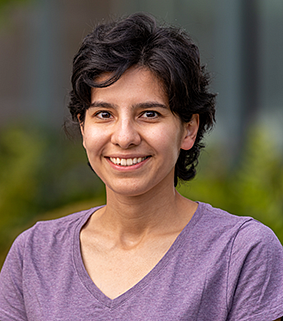Join us on Wednesday, Aug. 3 from 3:00 - 4:30 p.m. in the Ford Alumni Center Ballroom
OR
Join us on Zoom:
https://uoregon.zoom.us/j/93912895392?pwd=a080bFp2cWxIMjJIOTMrMGVpNlk0UT09
Meeting ID: 939 1289 5392
Passcode: 167540
One tap mobile:
8884754499,,93912895392# US Toll-free
8335480276,,93912895392# US Toll-free
The Discovery and Impact Symposium is a monthly series where University of Oregon and Thermo Fisher Scientific researchers will shed light on new understanding and innovations in the biosciences and their potential impact in the world. This series will increase scientific interactions between UO and Thermo Fisher, foster greater partnerships, and provide insights into technologies, materials, and techniques that could further each organizations’ mission to advance society and contribute to a healthier, cleaner, and safer world.
Our next speakers will be Parisa Hosseinzadeh, assistant professor at the Knight Campus, and Ryan Holly, staff scientist at Thermo Fisher Scientific.
Parisa Hosseinzadeh
Assistant Professor, Knight Campus
The Power of Computational Protein Design for Biomedical Diagnosis and Treatment
Despite great advances in biomedical sciences, we are still facing many challenges in the 21st century from fighting new pandemics to early diagnosis of cancer. It has become clear that in order to tackle these challenges, we need novel modalities for diagnosis, delivery, and treatment. Latest advances in computational biology have opened the door for generating novel macromolecules not observed in nature before, providing hope for solving some of these challenges. Inspired by these results, my lab develops computational tools to generate novel proteins and peptides to address some of the biomedical challenges of the 21st century. In this talk, I will go over a couple of stories from our work in this area.
Parisa Hosseinzadeh is an Assistant Professor in the Knight Campus at the University of Oregon, where she has been since 2020. She received her bachelor's degree at University of Tehran, Iran. She then moved to the States to pursue her PhD in Biochemistry at the University of Illinois at Urbana-Champaign where she studied and designed metalloproteins. She then moved to the Institute for Protein design at the University of Washington to pursue her postdoctoral work in the field of protein design. Her lab now works at the interface of chemistry, biochemistry, and computational biology to develop new molecules and tools to address the challenges of the 21st century. She is the recipient of NIH F32 postdoctoral award, Washington Research Foundation innovation fellowship, and NIH new innovator DP2 award.

Ryan Holly
Staff Scientist, Biology R&D, Thermo Fisher Scientific
Targeted Protein Degradation: Developing a toolbox for the next generation of drug discovery
Twenty years ago Craig Crews and Raymond Deshaies had the idea to target a protein of interest for proteasomal degradation by linking it to an E3 ligase, through a heterobifunctional small molecule termed a Proteolysis Targeting Chimera (PROTAC). Today TPD has become one of the hottest fields in drug discovery with its ability to “drug the undruggable.” PROTACs are advantageous over traditional small molecule inhibitors by targeting the whole protein for degradation instead of inhibiting a particular function. Additionally, they are catalytic and therefore are used at lower doses leading to less off target effects and drug resistance. While PROTAC’s were the first protein degraders to be discovered, this new approach spawned interest in numerous other technologies like molecular glues, Lysosomal Targeting Chimera’s (LYTACs), and Autophagy Targeting Chimeras (AUTACs) that take advantage of the cell’s degradation pathways. Over the last five years the field has seen exponential growth, underscoring the need to assess the efficiency of degradation and functional consequences of novel protein degraders. This seminar will provide an overview of targeted protein degradation and its implications, considerations for degrader design, as well as current methodological approaches that have been critical to fostering growth of this exciting new area of drug discovery.
Ryan received his doctorate in Chemistry and Biochemistry from the University of Oregon with a focus in molecular biology, where he studied the underlying mechanisms of animal cell polarity using biochemical techniques to interrogate the regulation of atypical protein kinase C. Ryan joined Thermo Fisher Scientific as a R&D Staff Scientist in 2020 to help drive the development of next generation protein and cell analysis tools, particularly for imaging and flow cytometry. Currently, Ryan’s technical leadership includes methods for assessing therapeutic potential and cell function within emerging drug discovery areas such as targeted protein degradation.

